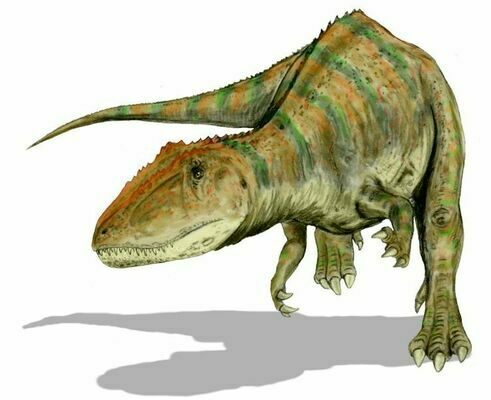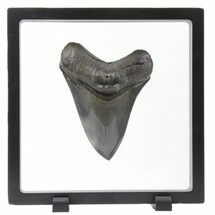This Specimen has been sold.
.63" Baby Carcharodontosaurus Tooth in Situ -Dekkar Formation, Morocco
This is a serrated, .63" long, dark brown fossil Carcharodontosaurus tooth from the Dekkar Formation in the Anoual Region of Morocco. The preservation is distinctively different than the more commonly seen Carcharodontosaurus teeth from the Kem Kem Beds several hundred miles to the South.
Carcharodontosaurus was a massive predatory dinosaur that reached sizes larger than that of Tyrannosaurus rex, though this tooth would have come from a juvenile with much smaller teeth. The tooth has been partially exposed from the sandstone.
Carcharodontosaurus was a massive predatory dinosaur that reached sizes larger than that of Tyrannosaurus rex, though this tooth would have come from a juvenile with much smaller teeth. The tooth has been partially exposed from the sandstone.
In the past few years, these distinctive dark brown fossil dinosaur and reptile teeth have begun to appear on the market in limited quantities. They are found in Anoual Region of Morocco near Talsint. These teeth have almost always been incorrectly identified as Jurassic in age and are sometimes assigned wildly inaccurate identifications based on this incorrect age.
These fossil teeth are coming out of the Late Cretaceous Dekkar Formation. This formation is considered an equivalent to the Kem Kem Beds several hundred miles south, and the species appear to be the same or at least very similar. Part of the confusion is that very limited geological mapping has been done in this region of Morocco until recently. Most of the mapped formations were Jurassic, so people assume dDekkar was the same.
The teeth out of Dekkar have some different and interesting preservation compared to the Kem Kem Beds. The rock holds together better, allowing many teeth to be prepped in the matrix, something rarely seen with Kem Kem teeth.
These fossil teeth are coming out of the Late Cretaceous Dekkar Formation. This formation is considered an equivalent to the Kem Kem Beds several hundred miles south, and the species appear to be the same or at least very similar. Part of the confusion is that very limited geological mapping has been done in this region of Morocco until recently. Most of the mapped formations were Jurassic, so people assume dDekkar was the same.
The teeth out of Dekkar have some different and interesting preservation compared to the Kem Kem Beds. The rock holds together better, allowing many teeth to be prepped in the matrix, something rarely seen with Kem Kem teeth.
About Carcharodontosaurus
Carcharodontosaurus comprised a genus of dinosaurs that dominated the land during the mid-Cretaceous Period, between 100-93 million years ago. This genus currently includes two gigantic species, which were among the largest known predatory dinosaurs. They were immense as the genera Tyrannosaurus and Giganotosaurus, but not as colossal as Spinosaurus.
Along with the spinosaurids, carcharodontosaurids were the largest predators in the early and middle Cretaceous throughout Gondwana, with species also present in North America (Acrocanthosaurus), and Asia (Shaochilong). Various scientists submit length estimates for C. saharicus, ranging between 12 and 13 m (39-43.5 ft) and weight estimates between 6 and 15 metric tons.
Carcharodontosaurids were a scourge of the land as giant, shark-toothed terrors in a world of monsters. Though spinosaurids would have been a formidable enemy, they may have occupied a semi-aquatic niche, which reduced competition. Both giant hunters also shared their world with menacing, 30-foot ancient crocodiles that had a taste for dinosaur.
Past the Turonian (93.9-89.8 mya), Carcharodontosaurus might have been replaced by the smaller abelisaurids in Gondwana and by tyrannosaurids in North America and Asia. The disappearance of carcharodontosaurids, spinosaurids, and other fauna in Gondwana and across the world suggests a global replacement event. Despite the event, fossils discovered in Brazil, which appear to be carcharodontosaurids, indicate some survivors of this group until the latest stage of the Cretaceous.
Carcharodontosaurus comprised a genus of dinosaurs that dominated the land during the mid-Cretaceous Period, between 100-93 million years ago. This genus currently includes two gigantic species, which were among the largest known predatory dinosaurs. They were immense as the genera Tyrannosaurus and Giganotosaurus, but not as colossal as Spinosaurus.
Along with the spinosaurids, carcharodontosaurids were the largest predators in the early and middle Cretaceous throughout Gondwana, with species also present in North America (Acrocanthosaurus), and Asia (Shaochilong). Various scientists submit length estimates for C. saharicus, ranging between 12 and 13 m (39-43.5 ft) and weight estimates between 6 and 15 metric tons.
Carcharodontosaurids were a scourge of the land as giant, shark-toothed terrors in a world of monsters. Though spinosaurids would have been a formidable enemy, they may have occupied a semi-aquatic niche, which reduced competition. Both giant hunters also shared their world with menacing, 30-foot ancient crocodiles that had a taste for dinosaur.
Past the Turonian (93.9-89.8 mya), Carcharodontosaurus might have been replaced by the smaller abelisaurids in Gondwana and by tyrannosaurids in North America and Asia. The disappearance of carcharodontosaurids, spinosaurids, and other fauna in Gondwana and across the world suggests a global replacement event. Despite the event, fossils discovered in Brazil, which appear to be carcharodontosaurids, indicate some survivors of this group until the latest stage of the Cretaceous.
SPECIES
Carcharodontosaurus sp.
LOCATION
Near Talsint, Anoual Region, Morocco
FORMATION
Dekkar Formation
SIZE
Tooth: .63" long, Entire Specimen: 1.4 x 1.1"
CATEGORY
SUB CATEGORY
ITEM
#299117
We guarantee the authenticity of all of our specimens.
 Reviews
Reviews













